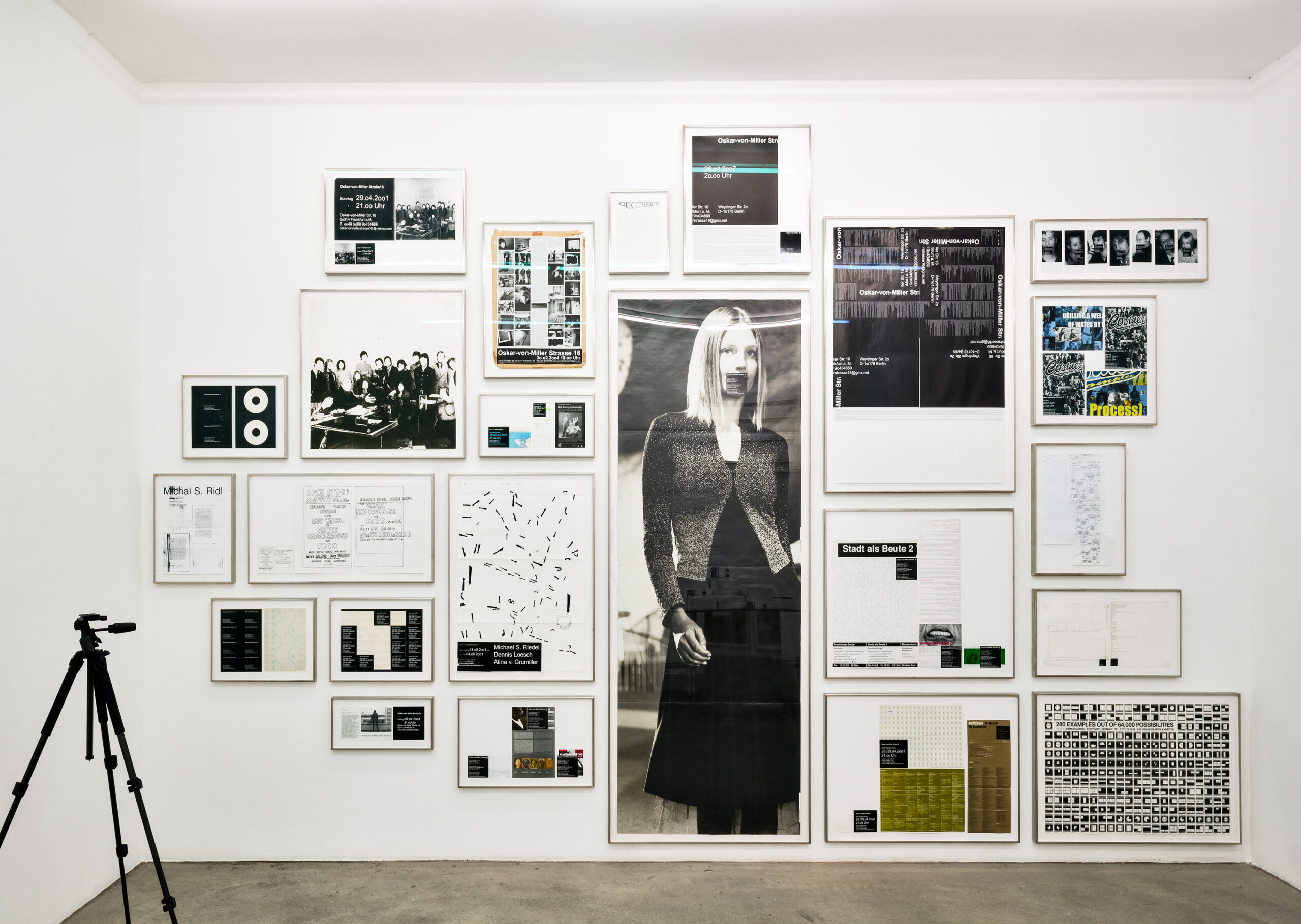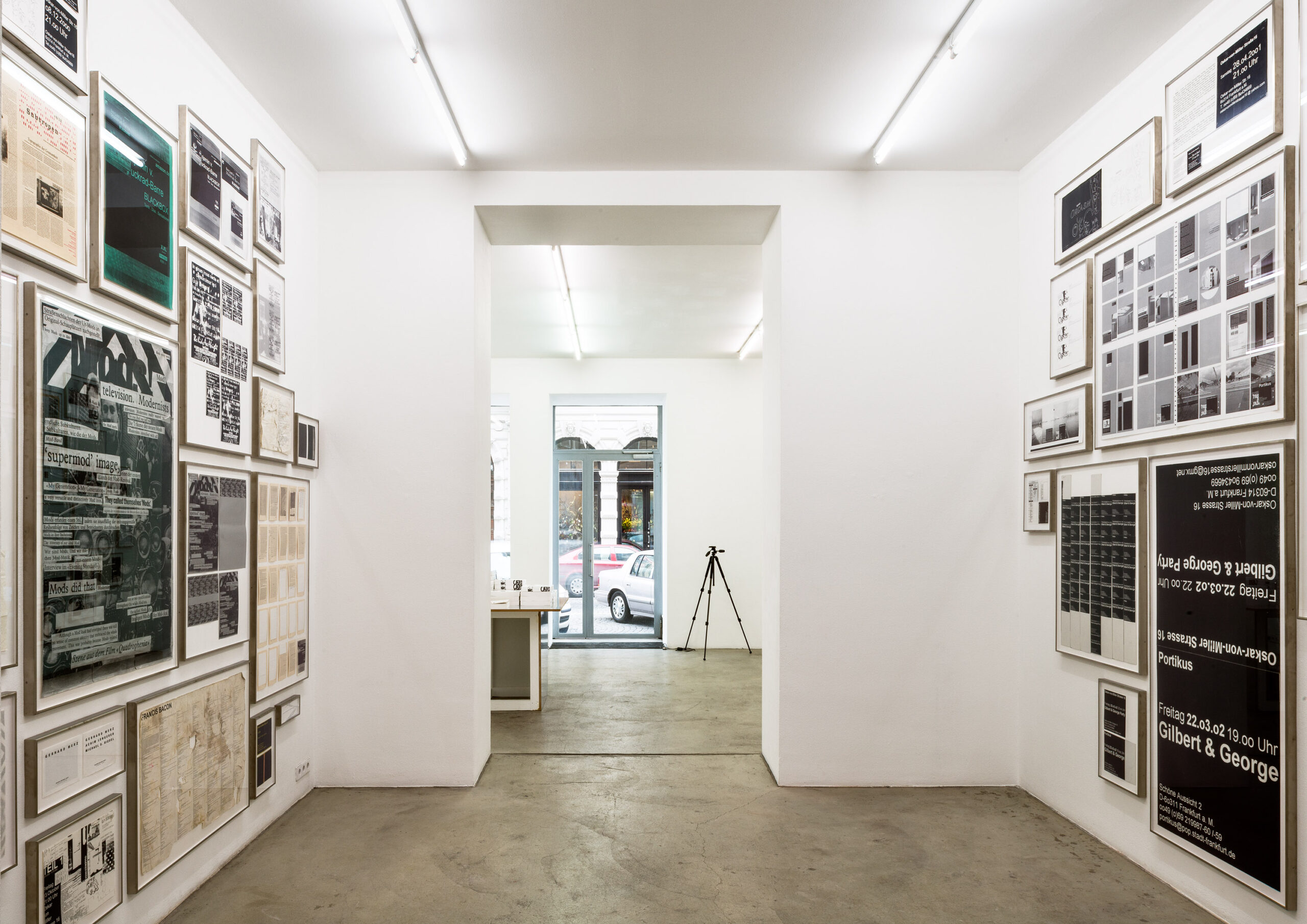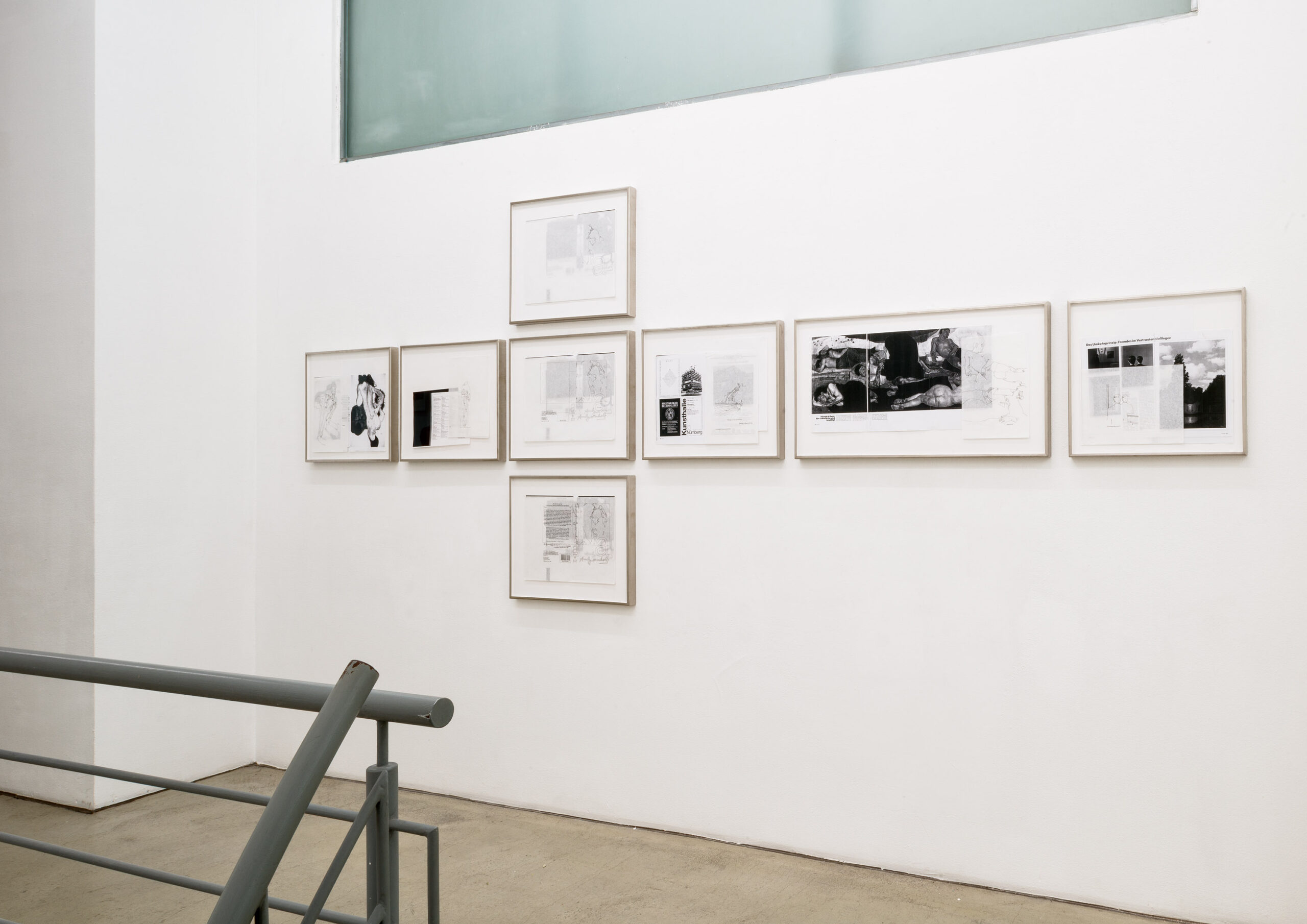
Liebe Gabi,
die siebte gemeinsame Ausstellung seit 2001. Ich nehme an, Du freust Dich genauso wie ich. Titel der Ausstellung: „record, label, play back“ (Missverständnis, Ignoranz, doppelte Unschärfe) Werke aus dem Archiv der „Oskar-von-Miller Strasse 16“ (2000-2011).
2003 erschien zur Ausstellung „Kontext-Form-Troja“ in der Wiener Secession, in der der Nachbau des Kunstraums „Oskar-von-Miller Strasse 16“ stand, die dazugehörige Publikation „Oskar“, die die Aktivitäten der Jahre 2000-2003 dokumentierte. Anfang dieses Jahres erschien nun die überarbeitete Neuauflage von „Oskar“, ergänzt um die Jahre 2003- 2011. Insofern macht auch die Neuauflage der Ausstellung für mich Sinn, reicher an Material und Reflektion.
Die Ausstellung ist auf Tournee und macht Station in Wien. Start war in London, wo im Mai bei David Zwirner die Werke unter dem Titel „Laws of Form“ ausgestellt waren. Vom Artist Talk mit Gregor Miur vom ICA ist mir nichts Erwähnenswertes in Erinnerung geblieben. Time Out London machte den Vorschlag „ich hätte einen ähnlichen Effekt mit der Ausstellung erzielen können, wenn ich einen gigantischen Penis mit einer Krone ausgestellt hätte“. Mehr Zeit zum Nachdenken hatte Adam Romple, dessen Artikel bei Daily Serving ich an dieser Stelle sehr empfehlen möchte. Anfang 2015 wird die nächste Station dann Paris sein, wo ich mich schon auf das Gespräch mit Jean-Pierre Criqui im Centre Pompidou freue. „Oskar“ lässt sich mit kurzen werbenden Worten wie folgt zusammenfassen: „Dies ist die Geschichte der Oskar-von-Miller Strasse 16 (2000 – 2011), einem Kunstraum der bekannt wurde als gigantisches Abspielgerät. Mit der Ansage „Aufnehmen – Labeln – Abspielen“ wurden hier von einer Gruppe junger Künstler die Sprachen des öffentlichen Kulturangebots nachgesprochen, oftmals ohne Verständnis für das Gesagte, dafür mit einem ästhetischen Interesse am Fehler der Übertragung. Das Buch selbst macht hiervon keine Ausnahme. Anhand von zahlreichen Bild- und Tonaufnahmen, letztere in Form eines Transkripts zweier Anekdotenkonferenzen, wird ihr langjähriges Troja hier nun wiedergegeben. Ein Naturerlebnis inmitten zahlloser Kulturanstrengungen!“
Als Display für das Buch dient die Installation „Warhol shooting“ (2001), ein Nachbau der Räumlichkeiten Warhols zweiter Factory, wie sie dem Foto von Cecil Beaton „Andy Warhol and the members of the factory“ (1969) zu entnehmen sind, und uns bereits 2001 als Kulisse für ein nachgestelltes Gruppenfoto diente. Teil der Installation ist auch eine aufgestellte Fotokamera, die in etwa Cecil Beatons damalige Perspektive einnimmt, und mit automatischer Aufnahmefunktion, Bilder von lesenden Besuchern der Ausstellung macht.
Zu den Lesern gehört auch Andy Warhol, der auf dem Cover den vor ihm schwebenden Titel zu entziffern versucht. Die Umschlaggestaltung ist eine Umformulierung der 1998 erschienenen Neuauflage seines Romans „a – a novel“ (Groove Press).
Umschrieben mit O s k r ließ sich aus a einfach Oskar machen. Wie sich überhaupt aus allem eine B-C-D-E…-Version machen lässt, die im Gegensatz zum Gemachten als das nicht Gemachte gelesen werden kann. Das ist der Einstieg in die Thematik, die die “Oskar-von- Miller Strasse 16“ über Jahre in zahlreichen Variationen durchgespielt hat. Die Fülle an Material sollte nicht erschrecken. Kennt man die Spielregeln, lässt sich die Vielzahl an Spielzügen entspannt verfolgen. In dem Vorwort Re-entry habe ich das Vorgehen als Nullpunkt der Kreativität bezeichnet, was aus anderer Sicht vielversprechend aber auch Kunst als Thema bedeutet.
Zusätzlich zum Buch sind zahlreiche Papierarbeiten ausgestellt, die im Zusammenhang mit den Veranstaltungen der “Oskar-von-Miller Strasse 16“ stehen, wie z. B. Poster und Flyer, für deren Herstellung oftmals existierendes Werbematerial überdruckt und beklebt wurde, um es dann erneut in Umlauf zu bringen und so die Übertragung von andernorts stattfindender Originalität anzukündigen. Das Archiv der „Oskar-von-Miller Strasse 16“ beinhaltet noch weiteres Bild-, Ton- und Installationsmaterial, das aus Platzgründen nicht gezeigt werden kann. Anhand dessen sich aber die rasante Entwicklung von Aufnahmekapazitäten darstellt. In der Zeit von 1997 – 2007 entstanden z. B. Tonaufnahmen von insgesamt 85.645 Minuten (ca. 60 Tage), wovon bisher 12.235 Minuten (ca. 9 Tage) transkribiert wurden, was wiederum ca. 45 Tage gedauert hat und sich entspannt in 4 – 5 Tagen lesen lässt. Je nachdem wie man liest. „Michael Riedel liest Oskar“ (was ich tatsächlich nie gemacht habe) ist der Titel der Veranstaltung, die am 18.11. im MAK Wien stattfindet. Dort werde ich den Kunstraum als formlose Stoffhülle schlaff von der Decke hängen lassen und gemeinsam mit Marcus Hurttig (Kurator, Museum der bildenden Künste Leipzig) darüber sprechen, wie sich basierend auf der falschen Veranstaltung die Dokumentation der „Oskar-von-Miller Strasse 16“ überhaupt als Kunst lesen lässt.
Beste Grüße
Michael Riedel
Dear Gabi,
This is our seventh exhibition together since 2001. I assume you are just as happy as I am. The exhibition’s title: “record, label, play back” (misunderstanding, ignorance, double blur), works from the archive of “Oskar-von-Miller Strasse 16” (2000 – 2011).
In 2003, at the occasion of the exhibition “context-form-Troy” at Vienna Secession, where the replica of the art space “Oskar-von-Miller Strasse 16” was located, the accompanying publication “Oscar” was released documenting the years 2000 – 2003. At the beginning of this year, the revised edition of “Oskar” was published, also covering the years 2003 – 2011. This is why also the new edition of the exhibition makes sense for me, as it has become richer in material and in reflection.
The exhibition is touring and also stops in Vienna. Starting point was London, where in May the works were on display at David Zwirner’s under the title “Laws of Form”. Nothing worth mentioning has stuck in my mind from the artist talk with Gregor Miur at ICA. Time Out London suggested “I could have achieved the same effect exhibiting a giant penis with a crown”. Adam Romple, whose article in Daily Serving I warmly recommend, took more reflection time. At the beginning of 2015, the next stop will be Paris and I am already looking forward to talking with Jean-Pierre Criqui at Centre Pompidou.
In a few and advertising words, “Oskar” can be summarized as follows: “This is the story of Oskar-von-Miller Strasse 16 (2000 – 2011), an art space that shot to fame as a giant music player. The statement “record – label – play” refers to a group of young artists who were repeating the language of the public offer of culture, very often without understanding what was said, but always with an aesthetic interest in the error of the broadcast. The book itself is no exemption to that. With several image and sound recordings, the latter in form of transcripts of two anecdote conferences, the year-long Troy is documented. A natural phenomenon amidst innumerable cultural efforts!”
The installation “Warhol shooting” (2001), a replica of the rooms of Warhol’s second factory as pictured in Cecil Beaton’s “Andy Warhol and the members of the factory” (1969) serves as display for the book and was already used as a setting for a re-enacted group photo in 2001. The camera is also part of the installation; it is placed in almost the same position as Cecil Beaton’s perspective was back then and, via an automatic recording function, takes pictures of the reading exhibition visitors. Also Andy Warhol is among the readers, as on the cover he tries to decipher the title floating before him. The cover design is a reformulation of the new edition of his novel “a – a novel” (Groove Press) that was published in 1998.
With the letters O s k r around it, a simply became Oskar. Just as one can make a B-C-D-E…-version out of everything else which, contrary to what was created, shall be read as the non-created. That is the first step towards a theme which “Oskar-von-Miller Strasse 16” has been played in several variations over the years. The large amount of material shall not be frightening. If one knows the rules of the game, it is quite relaxing to observe the multitude of moves. In the foreword “Re-entry”, I described this process as a point zero of creativity which from another perspective may sound promising but also means art as a theme.
In addition to the book, several other paper works in relation to events of “Oskar-von-Miller Strasse 16” are on display, such as posters and flyers which have often been printed or glued onto already existing advertising material just to be circulated once more , announcing some kind of originality taking place elsewhere. The archive of “Oskar-von-Miller Strasse 16” also includes other image, sound and installation material which for lack of space cannot be shown, but which document the rapid development of recording capacities. From 1997 to 2007, for instance, recordings lasting for 85,645 minutes (60 days) were produced, 12,235 minutes (9 days) of which have so far been transcribed, which in return took 45 days and can comfortably be read within 4 to 5 days, depending on the reading mode. “Michael Riedel reads Oskar” (which in fact I have never done) is the name of the event taking place at MAK Vienna on 18 November. I will let the art space hang loose from the ceiling as a formless rag and will, together with Marcus Hurttig (curator, Museum of Fine Arts Leipzig) talk about how, based on the wrong event, the documentation of “Oskar-von-Miller Strasse 16” may in fact be read as art.
Best wishes,
Michael Riedel




